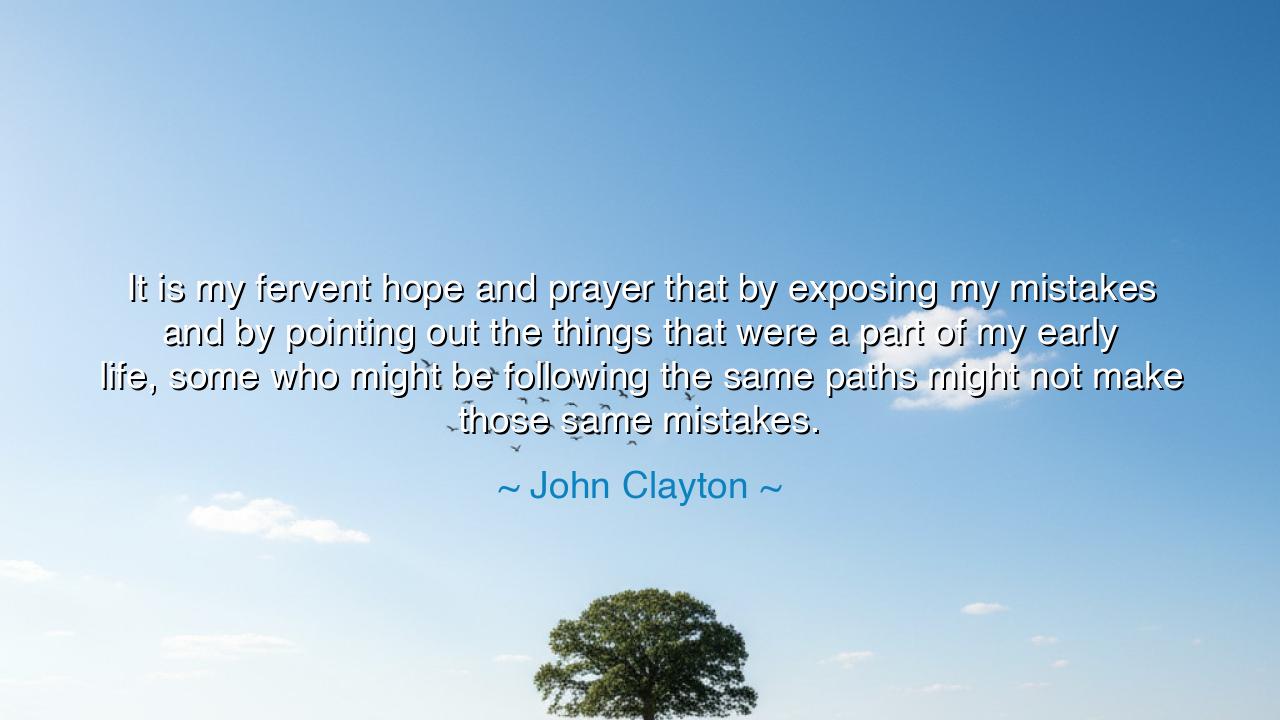
It is my fervent hope and prayer that by exposing my mistakes and
It is my fervent hope and prayer that by exposing my mistakes and by pointing out the things that were a part of my early life, some who might be following the same paths might not make those same mistakes.






“It is my fervent hope and prayer that by exposing my mistakes and by pointing out the things that were a part of my early life, some who might be following the same paths might not make those same mistakes.” — thus spoke John Clayton, a man who understood that wisdom is born not from perfection, but from repentance and reflection. In this humble declaration lies the essence of human growth — the courage to confront one’s own past, and the generosity to turn private pain into public guidance. His words shine like a lantern carried by one who has stumbled through darkness and now seeks to light the way for others.
Clayton’s message springs from one of the oldest truths known to humankind: that failure, when confessed and understood, becomes a teacher more faithful than success. The ancients revered such wisdom. The Greek philosopher Solon once said that to learn from one’s mistakes is the highest form of virtue, but to share that knowledge with others is the highest form of love. John Clayton, in his honesty, fulfills both — acknowledging that the path he once walked was flawed, yet hoping that his confession might spare another from sorrow. This is the humility of the sage and the compassion of the elder, who sees that knowledge hoarded is sterile, but knowledge shared becomes salvation.
In his “fervent hope and prayer,” one feels both penitence and devotion. There is the tone of a man who has wrestled with his past — perhaps with pride, temptation, or ignorance — and emerged chastened yet strengthened. The word fervent burns with sincerity; it is not a cold admission, but a fiery plea. For those who have truly suffered the consequences of their own errors, the desire to protect others from the same fate is not mere duty — it is redemption. In confessing his faults, Clayton transforms guilt into guidance, shame into service.
Consider the story of Saint Augustine of Hippo, whose Confessions became one of the greatest works of spiritual literature. In it, Augustine laid bare his youthful indulgences, his arrogance, and his moral blindness. He did not hide behind pride or pretend to have always been righteous. Instead, he offered his story as a mirror in which others might see their own folly and turn toward truth. Like Clayton, Augustine believed that one’s past, when faced with honesty, can become the foundation of another’s awakening. From the ruins of his mistakes rose a monument of wisdom that still stands today.
Such honesty demands great courage. It is easy to speak of victories, but far harder to confess one’s failures. Yet, as Clayton’s words reveal, there is greater power in vulnerability than in pride. The man who hides his flaws may seem perfect for a time, but the man who reveals them with humility becomes immortal in the hearts of those he helps. For every generation, the elders who speak truthfully of their errors become the bridges by which the young cross safely over the chasms of folly. Silence, in contrast, condemns others to repeat the same mistakes, while confession redeems both the speaker and the listener.
There is also a sacred moral duty hidden within Clayton’s reflection — the duty of remembrance. We are each shaped by the choices of those who came before us. If the wise do not speak of their missteps, if they conceal their scars in fear or shame, the next generation will walk blind into the same traps. Thus, every person who learns from hardship carries an obligation: to share, to warn, to teach. The elder who teaches from experience is like a lighthouse that endures storms not for itself, but to protect others from the rocks it once struck.
And so, the lesson of John Clayton’s words is timeless: do not hide your failures — transform them into wisdom. To those who have stumbled, let not your regret become silence. Speak your truth with humility, for it may save another soul. To those who are young and restless, listen to the voices of those who have walked before you; their scars are maps, their stories are shields. Every error you avoid because of another’s honesty is a victory for both of you.
Therefore, live not in fear of imperfection, but in the courage of reflection. Let your mistakes be seeds of compassion, and let your past become a teacher for those yet to come. For as John Clayton reminds us, even from the ashes of our worst choices, light may rise — not to glorify us, but to guide those who still walk the uncertain road of life.






AAdministratorAdministrator
Welcome, honored guests. Please leave a comment, we will respond soon